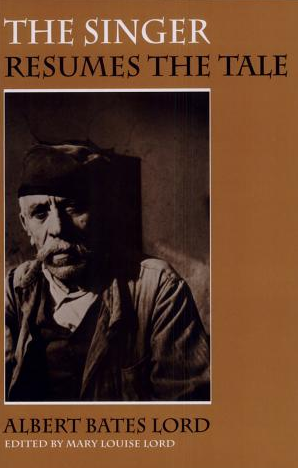“Not only every Homerist, but every scholar wishing to understand the roots of culture will read it eagerly. It is a deep well, and a heady draft.”—Barry B. Powell, Bryn Mawr Classical Review
 We are very happy to announce the forthcoming online publication of The Singer Resumes the Tale, by Albert Bates Lord, for free at the CHS website.
We are very happy to announce the forthcoming online publication of The Singer Resumes the Tale, by Albert Bates Lord, for free at the CHS website.
Long before writing was invented, people told stories and sang songs. But how is an oral poem composed? How is it transmitted beyond its circle of listeners to future generations? One of the preeminent folklorists of his time, Albert Bates Lord (1912-1991) here continues the project, begun in the classic work The Singer of Tales, of describing this traditional process.
Edited by Mary Louise Lord after the author’s death, The Singer Resumes the Tale focuses on the performance of stories and poems within settings that range from ancient Greek palaces to Latvian villages. Lord expounds and develops his approach to oral literature in this book, responds systematically for the first time to criticisms of oral theory, and extends his methods to the analysis of lyric poems. He also considers the implications of the transitional text—a work made up of both oral and literary components.
Elements of the oral tradition—the practice of storytelling in prose or verse, the art of composing and transmitting songs, the content of these texts, the kinds of songs composed, and the poetics of oral literature—are discussed in the light of several traditions, beginning in the ancient world, through the Middle Ages, to the present. Throughout, the central figure is always the singer. Homer, the Beowulf poet, women who perform lyric songs, tellers of folktales, singers of such ballads as “Barbara Allen,” bards of the Balkans: all play prominent roles in Lord’s book, as they have played central roles in the creation of this fundamental literature.
Oral tradition epic is not merely entertainment but has a serious function in its society. It contains the ideas and values of the society, as well as a concern for the basic problems of both the community and the individual, and how to solve them or to become reconciled to those that are insoluble. These are embodied in the myths with which, in my opinion, epics, including Homer’s and others in ancient Greece, originated.
The late Albert Bates Lord was Arthur Kingsley Porter Professor of Slavic and Comparative Literature, Emeritus, at Harvard University.
Mary Louise Lord is Professor of Classics, Emerita, at Connecticut College.
